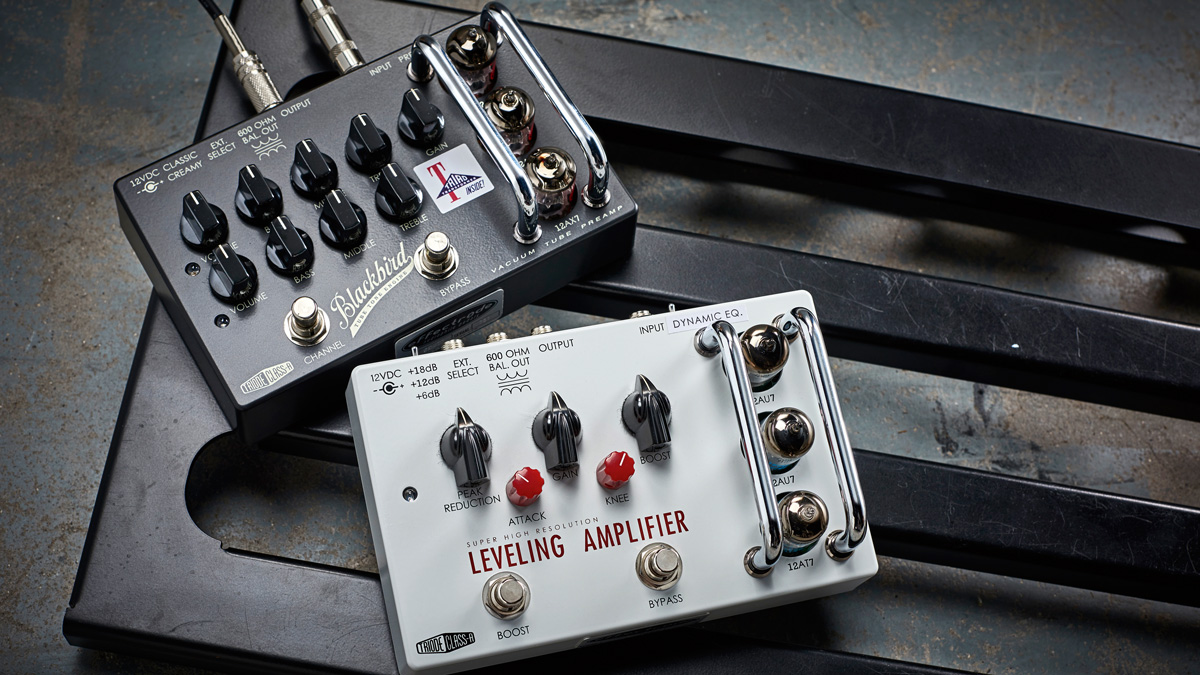MusicRadar Verdict
If you want to put real vintage valve tone at your toes, there’s really no alternative.
Pros
- +
Superb build.
Cons
- -
Very few to mention.
MusicRadar's got your back
In today’s crowded market, Effectrode’s unique valve-powered pedals have won it a place in some of the most revered signal chains in the world.
Never one to stand still for long, Effectrode recently introduced a new version of its best-selling SR-71 preamp and a mouth-watering new product, the Leveling Amplifier. Today, we’re looking at the latter.
As the name suggests, the Leveling Amplifier is a type of compressor. In recording studios, a leveller is a sort of crossover between a compressor and a limiter: it reduces dynamic range like a compressor and automatically amplifies the signal to make up for the reduced dynamics.
They are often used on final mixes to add punch and make things more listenable. Like the SR-71, the Leveling Amplifier has three dual triode valves (on this sample, an optional trio of very expensive Philips NOS, available as an upcharge over the regular JJs while stocks last).
Build
The Leveling Amplifier’s controls will be familiar to anyone who’s used a studio compressor.
There are three large knobs for peak reduction, gain and a footswitchable boost, which adds up to around 6dB when needed. Two smaller red pots govern the Attack and Knee, which influence how the Leveling Amplifier compresses the signal, making it subtler and more transparent if needed.
The Leveling Amplifier features a transformer-isolated balanced output, for the best direct-to-desk quality. On the back edge, together with in/out and remote switching jacks, there are two small toggle switches, one to set the basic operating level at +6, +12 or +18dB, the second to activate Dynamic EQ.
Want all the hottest music and gear news, reviews, deals, features and more, direct to your inbox? Sign up here.
“The Peak and Knee controls were requested by David Gilmour’s tech [also spookily called Phil Taylor - Ed] as a mod on the Effectrode PC-2A compressor,” Phil Taylor explains, “which is why they’re here on our new Leveling amp. The Dynamic EQ switch dynamically restores the high frequencies lost when the Leveling amplifier is compressing the signal. The heavier the compression, the harder it works to restore higher frequencies.”
Sounds
The Leveling Amplifier is super-quiet and transparent, adding a subtle warmth, with enhanced clarity at lower settings. We tried it on a variety of instruments with impressive results, particularly on a lap steel, where the Effectrode added sustain and evened out the results of some less than perfect picking to give a very pro-sounding recording.
Like all Effectrode products, this new pedal isn’t cheap, but it’s unique and superbly made.
The Leveling Amplifier is highly usable and sounds better than some high-end rack comp/limiters, giving it a potential home in many project studios as well as pedalboards.
Trevor Curwen has played guitar for several decades – he's also mimed it on the UK's Top of the Pops. Much of his working life, though, has been spent behind the mixing desk, during which time he has built up a solid collection of the guitars, amps and pedals needed to cover just about any studio session. He writes pedal reviews for Guitarist and has contributed to Total Guitar, MusicRadar and Future Music among others.

